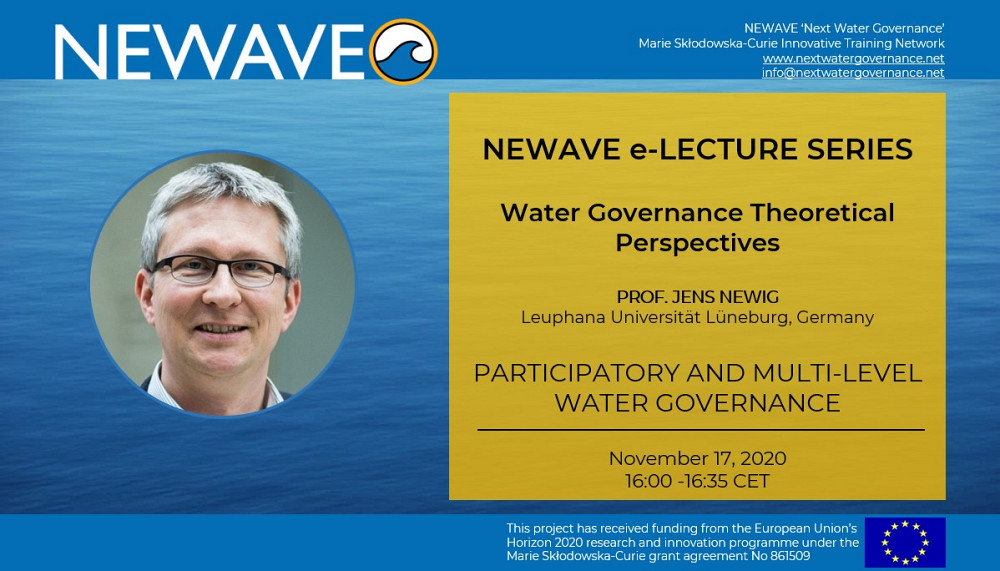NEWAVE e-Lecture Series: Participatory & Multi-level Water Governance | Prof. Jens Newig
Participatory & Multi-level Water Governance
Sustainable water governance relies on a range of principles, among which is collaborative and participatory governance in multi-level and scale adapted system. The participation of citizens and of societal stakeholders into water-related public decision making is expected to improve decision outputs and outcomes, e.g. by incorporating local knowledge, or by allowing for conflict resolution and better accepted decisions. Multi-level systems of water governance, which are ideally tailored to the spatial scale of the water system (e.g. a river basin), have long been touted to facilitate communication among riparian jurisdictions and to advance sustainable solutions. While important in their own right, participation and multi-level governance are also not independent of each other. We will first discuss participation and multi-level governance separately, then in conjunction, and close by illustrating how these principles work in practice from research into the implementation of the EU Water Framework Directive. While widely applied in practice, it is still an open question of whether participation, multi-level and scale-adapted water governance will serve as game changers to solving the globe’s pressing water problems.
References:
Moss, T. (2003.) Solving Problems of 'Fit' at the Expense of Problems of 'Interplay'? The Spatial Reorganisation of Water Management following the EU Water Framework Directive, in How Institutions change. Perspectives on Social Learning in Global and Local Environmental Contexts, eds. H. Breit, A. Engels, T. Moss and M. Troja. Opladen: Leske + Budrich: 85-121.
Moss, T. and J. Newig. (2010). Multilevel water governance and problems of scale: Setting the stage for a broader debate. Environmental Management 46 (1): 1-6.
Newig, J. and T.M. Koontz. (2014).'Multi-level governance, policy implementation and participation: the EU's mandated participatory planning approach to implementing environmental policy. Journal of European Public Policy 21 (2): 248-67.
Newig, J., D. Schulz and N.W. Jager. (2016). Disentangling Puzzles of Spatial Scales and Participation in Environmental Governance - The Case of Governance Re-scaling Through the European Water Framework Directive. Environmental Management 58 (6): 998-1014.
Newig, J., E. Challies, N.W. Jager, E. Kochskämper and A. Adzersen. (2018). The Environmental Performance of Participatory and Collaborative Governance: A Framework of Causal Mechanisms. Policy Studies Journal 46 (2): 269-97
Prof. Jens Newig
Jens Newig is full Professor of Governance and Sustainability at Leuphana University Lüneburg, Germany. He is member of the Faculty of Sustainability and of the Centre for the Study of Democracy and director of Leuphana’s Institute for Sustainability Governance (INSUGO). A geo-ecologist by training with a doctoral degree in Law and an Habilitation in political science and systems science, Jens is now engaging in inter- and transdisdisciplinary governance research. Building on research projects funded inter alia by the European Research Council or the German Research Foundation, Jens and his team have published widely on issues of water governance, participatory, collaborative and globalized environmental and sustainability governance, aspiring produce but also to cumulate evidence in the field.
About the e-Lecture Series:
This online training module has the objective to engage the NEWAVESRs and the audience in different water governance perspectives. All lectures are open to the public upon registration.
Please register here
A participation certificate can be requested if attending at least 80% of the online public talks.
*All times are in CET (UTC+1)
We would love to know what you think! Please leave a comment below and engage in our online discussion group.




